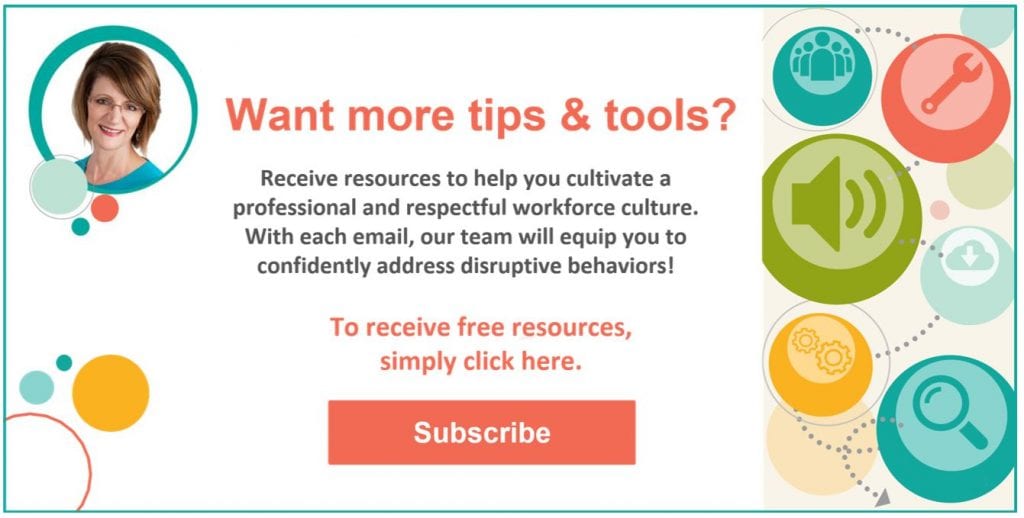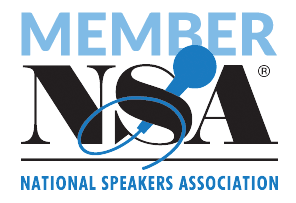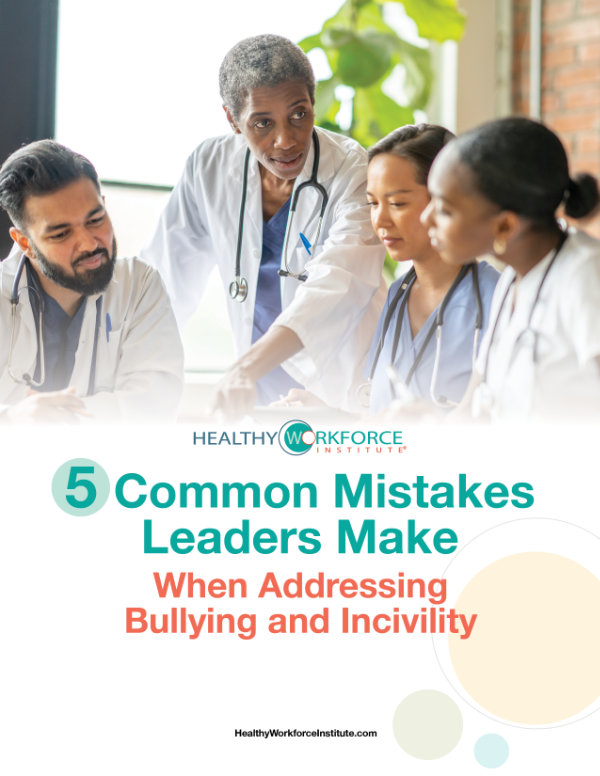 There is an epidemic of bullying and incivility in healthcare, and it has to change. It not only affects morale and retention, but it also affects patient outcomes.
There is an epidemic of bullying and incivility in healthcare, and it has to change. It not only affects morale and retention, but it also affects patient outcomes.
A new nurse shared that she was really overwhelmed and stressed with patient care. It was one of those days when she was struggling just to deliver the minimum care required of her patients. While running from room to room, she walked passed an experienced nurse who said, “How’s it going?” This new nurse replied, “I’m drowning” to which the experienced nurse replied (as she kept walking away), “Then you’d better learn how to swim…”
Really? She could have helped her – should have, but she didn’t. Think about the impact to that new nurse’s patients.
Did you know?
Study after study shows the negative impact disruptive behaviors have on patient outcomes.
In fact, research shows that…
• 71% of physicians and nurses have linked incivility to medical error (study by John’s Hopkins).
• 27% of them said it led to a patient’s death.
• Nursing Solutions, Inc. showed that 81% of nurses who leave an organization cite peer and nurse manager relations as a cause for leaving.
We have an ethical responsibility to our patients and colleagues to do better.
Imagine a workplace where everyone goes out of their way to support and help each other learn and grow; where all roles are valued and everyone feels appreciated and valued.
A workplace where everyone makes decisions based on what’s best for patients first, then what’s best for each other, and then what’s best for them.
Imagine being a professional in this world.
Picture creating a culture where there is a waitlist of people who want to work in your department because:
• Everyone goes out of their way to support each other – no matter what
• People feel appreciated, nurtured, and valued as an important member of the team
• Employees are encouraged to become the best versions of themselves
• Individuals communicate respectfully and work together as a cohesive team
• Employees are committed to leaving a legacy
This can be your reality – IF – you do your part to stop the cycle of bullying and incivility. Here are a few ways:
If you’re an employee…
STEP UP
The reality is that we live in a world in which good people remain passive in the face of bullying and injustice. A few years ago, a study of 1700 healthcare employees revealed that 90% would stay silent if they witnessed bad practice or bad behavior, even in life and death situations! Why is that? Sometimes it’s because we think it’s someone else’s responsibility (like the boss), we’re worried about how that person will respond, or we’re caught off guard and don’t know what to say or do. Knowing this can help.
From now on, make the decision up front to confront any acts of bullying behavior immediately when you see them happening. It’s about stepping up by sending a message that bad behavior won’t be tolerated anymore. Not here – not now – not ever!
FORM A POWERFUL COALITION
Chances are, you’re not the only one who is sick and tired of the phrase, nurses eat their young. Find others who are just as fed up with the bad behaviors and are willing to confront and support. What I know for sure is that there is strength in numbers. Remember, there are more of you than there are bullies. Once you’ve all agreed that you want to create a professional, nurturing, and supportive work environment, it’s easy to influence others to do the same. And, the bullies stand out like a sore thumb.
CONFRONT BAD BEHAVIOR
When nurses share experiences where someone ripped their coworker a “new one” in front of others, I always ask, “Well. What did everyone do?” Crickets. Everyone looks at each other as if I was asking them did they give up their first-born child. What I’ve found is that nobody is speaking up IN the moment when they are witnessing a coworker being tortured. That ends today!! When you witness an act of bullying, you need to step up and confront! The easiest way to do this is to just name the behavior.
Coworker says to new nurse: “You won’t last a week here.”
You should say this!!! “Whoa Whoa. Time out. Telling her she won’t last a week here is inappropriate and inconsiderate.”
Coworker is yelling at a nursing assistant.
You should say, “Stop it. You are yelling at <insert name> and you need to stop.”
If you’re a leader…
STOP USING SILENCE AS A STRATEGY
After thousands of conversations with leaders, I’ve learned that in general, leaders aren’t addressing disruptive behaviors. They’re not doing anything about it because they don’t know what to say or how to confront an employee who is toxic. Yet, they may know the negative impact some employees have on the rest of their people. We are hemorrhaging great nurses to this problem and can no longer use silence as a strategy.
ENGAGE IN ONGOING EDUCATION AND TRAINING
Addressing workplace bullying and incivility requires skills. The good news is that you can learn these skills so that you can set behavioral expectations and hold people accountable for professional conduct.
GET THE SUPPORT YOU NEED TO TERMINATE A TOXIC EMPLOYEE
I’ve heard over and over again that a manager wants to terminate a toxic employee but isn’t “allowed” for whatever reason. So, if you really want to hold employees accountable, strengthen the relationship you have with your HR partner and find out how to build a case through deliberate documentation, if you choose to go down the disciplinary path.
When leaders are equipped with the skills and tools that they need their employees are more engaged, fulfilled, and better serve patients and each other. This results in high-performing teams with increased retention and improved patient outcomes.
We’ve helped so many frontline leaders and their teams tackle this epidemic and feel confident in their abilities to address disruptive behaviors. Through our custom programs, we work with healthcare organizations to:
• Reduce incidents of bullying and incivility
• Set behavioral expectations and hold employees accountable for professional behavior
• Skillfully handle difficult situations involving employee behavior
If you truly want to create a culture that rejects any incidence of bullying and incivility and promotes professionalism, it can’t just be “sign this code of conduct” (note: signing a piece of paper doesn’t change behavior) or a one time in-service on bullying. You can’t check a check box when it comes to transforming the way people treat each other. Changing a culture requires organizational by in, leadership development, and employee involvement.
So let’s get started!
To shift your workplace from being disrespectful, unsupportive, and dysfunctional to professional, nurturing, and supportive, start by joining our community of healthcare employees and leaders who want to learn simple and practical strategies to address disruptive behaviors.
Then, let’s talk about your results and see how we can help.
At the Healthy Workforce Institute, we believe that the way we treat each other should be just as important as the care we provide.













